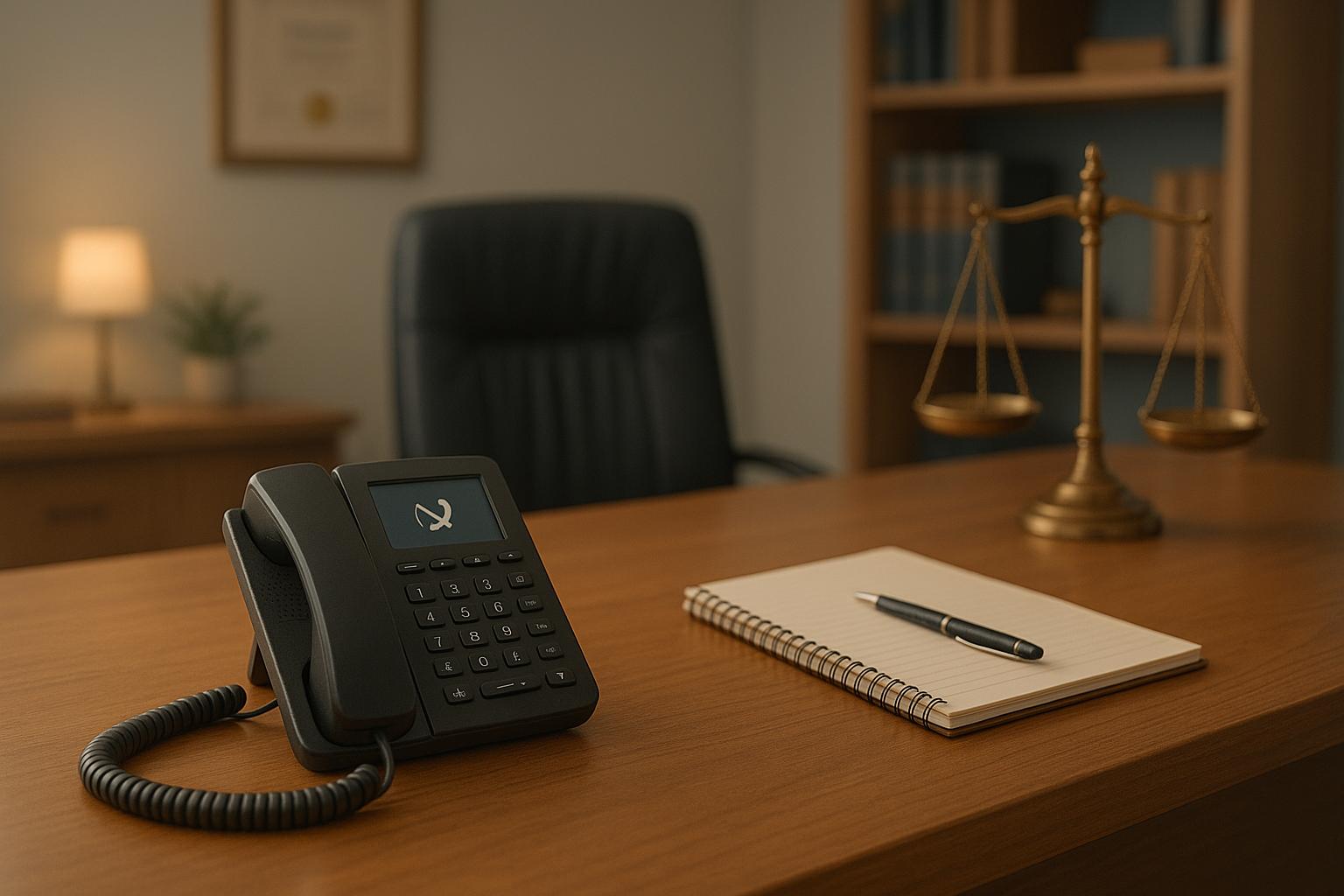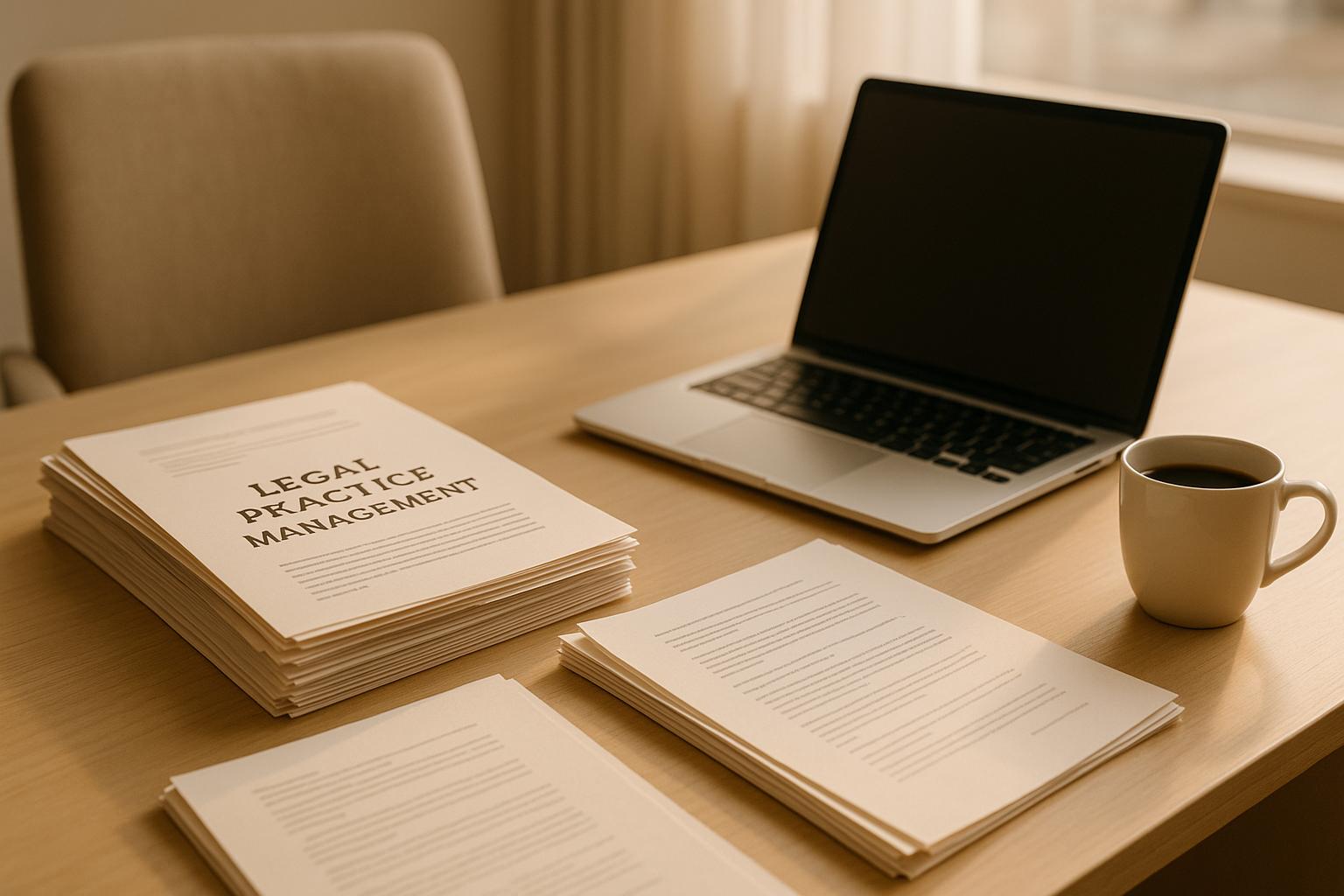Missed Calls Losing Cases? Solutions for Law Firms

Missed calls are costing law firms money and clients. Studies show that firms responding to inquiries within 5 minutes achieve a 400% higher conversion rate. Yet, 35% of calls to law firms go unanswered, and 80% of callers who hit voicemail hang up. This means lost revenue - potentially $8,000 per missed call - and damaged reputations.
Here’s why this happens:
- Limited staff availability: Small teams struggle to handle high call volumes.
- After-hours calls: Legal emergencies don’t follow a 9-to-5 schedule.
- Manual intake processes: Slow, inconsistent, and error-prone systems frustrate clients.
AI-powered intake automation offers a solution. Tools like Serva provide 24/7 availability, smart lead screening, and automated follow-ups. They reduce missed calls, improve response times, and integrate with practice management systems. Firms using AI have seen missed call rates drop from 34% to under 5%, with significant boosts in revenue.
To improve your firm’s client intake:
- Review your current process: Track missed calls, peak times, and response rates.
- Test AI tools like Serva: Use a free trial to compare results with your current system.
- Train your team: Leverage analytics to refine workflows and maximize results.
Missed calls don’t have to mean missed opportunities. AI solutions can help your firm stay competitive and responsive.
Voice AI for Law Firms: Stop Losing Clients to Missed Calls
Why Law Firms Miss Calls and Lose Clients
Figuring out why calls go unanswered is the first step to solving the problem. Many of these issues come down to outdated systems, limited staff, and processes that just don’t keep up with what clients expect today. Let’s break down the specific office and intake problems that not only lead to missed calls but also chip away at client trust.
Common Office Problems That Lead to Missed Calls
One of the biggest reasons calls are missed is limited staff availability. Many law firms run with small administrative teams. When staff members are juggling multiple responsibilities - like answering phones, scheduling appointments, managing files, and greeting walk-ins - there’s no way to keep up with every incoming call.
Another major issue is after-hours inquiries. Legal emergencies don’t stick to a 9-to-5 schedule, but most law firms do. When potential clients call in the evening, on weekends, or during holidays, they often get sent to voicemail. By the time your office reopens, those callers may have already hired another firm.
High call volumes during peak times can overwhelm even larger teams. For example, personal injury firms often experience a flood of calls after major accidents or during ad campaigns. When multiple calls come in at once, some inevitably end up in voicemail or get met with a busy signal.
Staff absences create another layer of difficulty. If the receptionist is out sick, on vacation, or even just on a lunch break, there’s often no backup plan in place. These small gaps in coverage add up, leading to missed opportunities over time.
On top of these staffing and scheduling challenges, many firms still rely on outdated manual intake processes, which only make matters worse.
Problems with Manual Client Intake
Even beyond staffing challenges, manual intake methods create their own set of roadblocks for client engagement. Manual data collection is a prime example - it’s slow and prone to errors. If staff members spend 10–15 minutes gathering basic information from one caller, other potential clients might not even get through.
Inconsistent information gathering is another frequent issue. Different staff members may collect different details, leading to incomplete client profiles and missed follow-up opportunities. This kind of inconsistency can make your firm seem disorganized.
Slow response times are another downside of manual systems. Processes like scheduling, documentation, and follow-ups take longer, which can frustrate potential clients. Many will simply move on to a firm that responds faster.
Lastly, limited scalability becomes a glaring problem as your firm grows. Hiring more staff to handle increased call volume is expensive and doesn’t always address the underlying inefficiencies. Manual processes just don’t scale well when business picks up.
How Missed Calls Hurt Your Firm’s Reputation
All these operational and intake challenges don’t just cost you clients - they also hurt your firm’s reputation. Negative online reviews are a common result of poor responsiveness. When people can’t reach your firm during stressful situations, they often vent their frustrations on platforms like Google, Yelp, or legal directories. These reviews can discourage future clients from reaching out.
Word-of-mouth damage is another consequence. If someone has a bad experience trying to contact your firm, they’re likely to share that frustration with friends, family, and colleagues. This kind of negative feedback can stick around and harm your reputation for years.
Finally, there’s the competitive disadvantage. Other firms are adopting better communication systems, making it easier for potential clients to reach them. If people find it hard to connect with your firm but can call your competitors without any trouble, the choice becomes obvious. A reputation for being "hard to reach" can become a major obstacle to growth.
Solution: AI-Powered Client Intake Automation
Missed calls, overwhelmed staff, and inconsistent intake processes can lead to lost opportunities for law firms. AI-powered client intake automation steps in as a game-changer, addressing these challenges head-on. By removing staffing limitations and ensuring every inquiry gets immediate attention, this technology transforms how firms connect with potential clients.
AI-driven intake systems operate around the clock, gathering consistent and reliable information from every caller. This ensures your firm is always available to clients when they need you most, while also streamlining interactions for maximum efficiency.
Key Features of Serva

Serva's AI-powered legal intake platform is tailored to tackle the most common pain points in client intake. Its standout features include 24/7 availability, efficient lead screening and routing, multilingual capabilities, and seamless integration with practice management tools.
- 24/7 Client Intake: Serva ensures potential clients never face voicemail or busy signals. Whether someone calls in the middle of the night or during a busy workday, the system is ready to assist and capture their information.
- Smart Lead Screening: The platform automatically assesses incoming inquiries, asking targeted questions to determine the urgency and viability of each case. Urgent matters are flagged for immediate attention, while routine inquiries are categorized and scheduled efficiently. This allows attorneys to focus on qualified leads without wasting time on less relevant cases.
- Multilingual Support: Serva supports multiple languages, making it easier for your firm to assist clients from diverse backgrounds. This feature broadens your reach, especially in metropolitan areas, without requiring additional bilingual staff.
- Seamless Integration: The platform integrates with your existing practice management system, ensuring a smooth flow of information and eliminating the need for manual data entry.
How AI Improves Client Communication
Beyond simplifying intake, AI elevates client communication by automating and personalizing interactions. Here’s how:
- Efficient Case Screening: The system tailors its questions to each caller, ensuring potential clients receive the attention they need based on their specific legal issues and urgency.
- Automated Follow-Ups: No inquiry falls through the cracks. Whether it’s scheduling a follow-up call or sending an informational email, the platform ensures consistent communication, keeping your firm at the forefront of clients' minds.
- Real-Time Notifications: Your team is instantly alerted to new leads, urgent cases, or updates on ongoing communications. This keeps everyone aligned and ensures no opportunity is missed.
- Client Progress Tracking: The system tracks interactions and progress, maintaining transparency and boosting efficiency throughout the intake process.
Security and Legal Compliance
In the legal field, protecting client confidentiality is non-negotiable. Serva is built with enterprise-grade security, adhering to the strict standards required by legal professionals. By safeguarding sensitive client data, the platform ensures your firm remains compliant with confidentiality regulations.
This robust security infrastructure allows you to focus on delivering top-tier legal services while maintaining client trust and peace of mind.
sbb-itb-4140cb6
Virtual Receptionist and Communication Strategies
Law firms across the United States are turning to virtual receptionist solutions to tackle a common issue: 35% of incoming calls go unanswered, leading to missed opportunities and potential revenue loss. By combining AI-powered tools with smarter communication strategies, firms can ensure every client inquiry gets the attention it deserves.
How Virtual Receptionists Work
Serva's AI-powered virtual receptionist acts as the first line of communication for your law firm - available 24/7. Unlike traditional receptionists limited to business hours, this system is always ready to answer calls immediately. It engages callers in a natural, conversational manner, gathering essential details and assessing the urgency of their needs. For urgent legal matters, the system flags the case and sends real-time alerts to the appropriate attorney. Non-urgent inquiries are scheduled for follow-up during regular business hours. This ensures that no matter the time of day, your firm delivers prompt and professional service.
What’s more, the virtual receptionist integrates directly with your practice management software. This eliminates the need for manual data entry, allowing client information to flow seamlessly into your existing workflows.
Automated Follow-Ups and Alerts
Virtual receptionists don’t just stop at answering calls - they also handle follow-ups. Many law firms struggle with this aspect of client communication; 70% lack a formal follow-up system. Serva’s automated follow-up feature bridges this gap by sending reminders when consultations aren’t immediately scheduled. These follow-ups can include emails, text messages, or even phone notifications to confirm receipt of the inquiry and keep potential clients engaged.
Urgent cases trigger real-time alerts, ensuring attorneys and staff can respond quickly. Meanwhile, detailed logs track each client’s journey - from the initial call to eventual conversion. For example, a mid-sized personal injury firm in the U.S. saw its missed call rate drop from 30% to under 5%, while new lead conversions jumped from 10% to 28%. This translated into thousands of dollars in additional monthly revenue and higher client satisfaction.
The system also simplifies appointment scheduling. It sends automatic confirmation emails and reminders, helping reduce no-shows. Clients can even reschedule appointments through automated links, saving your team time and allowing them to focus on more critical tasks. By implementing these strategies, your firm reinforces its reputation for being responsive and client-focused.
How US Law Firms Can Start Using AI Solutions
US law firms can improve their client intake process with AI tools by following a clear, step-by-step approach.
Review Your Current Intake Process
Before jumping into AI solutions, take a close look at your current client intake process to pinpoint where potential clients might be slipping through the cracks. Start by tracking your missed call rate over a two-week period. Most phone systems come with basic call logs, which can help you spot trends like peak call times and overall call volume.
Examine whether your staff has enough coverage during busy periods. If your receptionist is multitasking - handling calls, scheduling appointments, and assisting walk-ins - there's a good chance some client opportunities are being missed. Also, check how many calls end up in voicemail and whether follow-ups are being made consistently. These gaps can give you a clearer picture of what needs improvement.
Think about other potential obstacles for clients, like excessive paperwork or limited hours for scheduling consultations. Reducing these barriers can help keep potential clients engaged. Use this analysis as a baseline to measure the impact of introducing AI into your process.
Try Serva's Free Trial
Once you understand your current intake challenges, it’s time to test an AI solution. Serva offers a 30-day free trial, giving law firms full access to its features without any upfront cost. This trial lets you compare the AI system directly against your existing procedures.
During the trial, you can explore Serva’s 24/7 client intake capabilities, multilingual support, case triage features, and seamless integration with your practice management software. The AI handles tasks like screening calls, collecting essential case details, and assessing urgency - all while maintaining a professional tone.
In the first week, run the AI system alongside your current process to compare response times, client feedback, and conversion rates. Use this time to test scenarios relevant to your practice, such as gathering details for personal injury cases or handling sensitive family law inquiries. The AI will adapt to your firm’s specific needs and terminology over time, making the process even smoother.
Train Staff and Track Results
After testing the system, focus on training your team to use the AI effectively and track its impact. Proper training ensures your team can fully leverage the system’s features and act on its insights.
Introduce your attorneys and paralegals to Serva’s analytics dashboard, which provides data on call volume, response times, lead quality, and conversion rates. These reports can help you identify which types of cases bring in the most inquiries and when client calls peak.
Set clear protocols for responding to leads and use the dashboard to monitor metrics weekly. This helps you measure improvements in response times and case conversions. By integrating these steps into your existing workflow, you can ensure that the AI system delivers actionable insights and drives real results.
Regularly tracking these metrics will help you fine-tune your approach and maximize the benefits of AI in your client intake process.
Conclusion: Preparing Your Law Firm for the Future
Ineffective communication is costing U.S. law firms billions of dollars. Statistics paint a clear picture: 35% of incoming calls go unanswered, 80% of callers who hit voicemail hang up without leaving a message, and every missed call represents an average potential revenue loss of $8,000. These numbers highlight the urgent need for change in how law firms handle client intake.
The consequences of outdated intake processes go beyond financial losses. Missed calls not only mean lost cases but also harm your firm's reputation and weaken client trust - two critical factors in an increasingly competitive legal market.
The solution? AI-powered automation. By adopting systems like Serva, law firms can ensure no call goes unanswered. For example, firms using AI intake technology have seen their missed call rates drop from 34% to under 5% in just six months. One personal injury firm even leveraged this technology to capture high-value cases that would have otherwise gone to voicemail, boosting their annual revenue by over $500,000.
With tools like Serva's 24/7 AI-powered intake system, your firm can handle client screening, appointment scheduling, and case triage at any time - day or night. This means no more missed opportunities due to timing or staffing challenges. Plus, with a 30-day free trial, testing this technology alongside your current systems is straightforward and risk-free.
However, implementing new technology is just the first step. To truly succeed, firms must measure and refine their processes. By tracking metrics like response times, conversion rates, and client satisfaction, you can continuously improve and maximize the return on your investment. The firms that prioritize responsiveness and seamless communication will lead the way in the legal industry.
With the average law firm spending $649 to generate a single lead, investing in reliable intake automation isn’t just an option - it’s a necessity for future growth and success. Don’t let another missed call cost your firm its next big case.
FAQs
How does AI-powered intake automation help law firms improve client communication and response times?
AI-powered intake automation transforms how law firms handle client communication by offering round-the-clock availability and instant responses to inquiries. These systems seamlessly capture, organize, and direct client requests from multiple channels, ensuring every potential client gets the attention they deserve.
By cutting response times from minutes to mere seconds, these tools not only streamline the intake process but also improve client engagement, boost satisfaction, and drive higher lead conversion rates. This technology lets law firms stay efficient and responsive while dedicating more time to delivering personalized services.
What are the advantages of using a virtual receptionist for law firms compared to hiring in-house staff?
A virtual receptionist brings several advantages to law firms that go beyond what traditional in-house staff can offer. One major benefit is their 24/7 availability, ensuring that no client call goes unanswered. This constant coverage can play a big role in boosting client satisfaction and building trust, especially with potential clients who might reach out after regular business hours.
Another perk is the potential to cut overhead costs. Law firms can save money on salaries, office space, and equipment, making this an efficient alternative. Plus, virtual receptionists offer flexibility, allowing firms to adjust to fluctuating workloads without the hassle of hiring and training new staff.
By ensuring timely responses and simplifying communication with clients, virtual receptionists not only help retain clients but also improve overall efficiency. This lets law firms concentrate on their true expertise - practicing law.
How does Serva ensure client confidentiality and help law firms stay compliant with legal and ethical standards?
Serva assists law firms in safeguarding client confidentiality and staying compliant with legal and ethical standards through strong security measures like data encryption and access controls. These tools help protect sensitive client information, minimizing the chances of unauthorized access or data breaches.
The platform is also built to align with legal confidentiality rules, including Model Rule 1.6, ensuring client data is managed responsibly and ethically. By streamlining processes while maintaining strict privacy standards, Serva enables law firms to meet their professional responsibilities and deliver secure, dependable service to their clients.



